

Evidence-Based Practice: An Opportunity for Continuing Education Providers. By Robert Mullen, Director, National Center for Evidence-Based Practice in Communication Disorders, ASHA Evidence-based practice (EBP) has emerged as an important principle in the delivery of speech-language pathology and audiology services in the past decade.
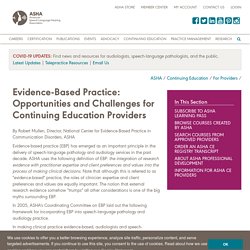
ASHA uses the following definition of EBP: the integration of research evidence with practitioner expertise and client preferences and values into the process of making clinical decisions. Note that although this is referred to as "evidence-based" practice, the roles of clinician expertise and client preferences and values are equally important. The notion that external research evidence somehow "trumps" all other considerations is one of the big myths surrounding EBP. Perceived Benefits of the Use of Learning Contract. Use of Reflection-in-Action and Self-Assessment to Promote Critical Thinking Among Pharmacy Students. Effect of a program to increase the cognitive level of questions asked in clinical postconferences. Incorporating Evidence in Clinical Education; Barriers and Opport. Faculty Development Seminars Based on the One-Minute Preceptor Improve Feedback in the Ambulatory Setting. School of Communication Sciences and Disorders.
To assist Clinical Educators (CEs) in providing students with high quality practicum experiences we have developed a range of resources. Jump to: Obtaining Professional Associate Status with McGill University Please contact lili.saran@mcgill.ca if you wish to enquire about obtaining Professional Affiliate status with McGill University. The Collaborative Approach to Clinical Education Jeanne Claessen, Former Head of Clinical Program (1995-2009) School of Communication Sciences and Disorders McGill University.
Strategies for Clinical Teaching Joanne E. Schupbach Practice Management and Professional Issues Professional Issues 6944. Editor's note: This text-based course is a written transcript of the live seminar, "Strategies for Clinical Teaching," presented by Joanne Schupbach, M.S., M.A., Manager Audiology Clinical Education, Assistant Professor, Rush University Medical Center.
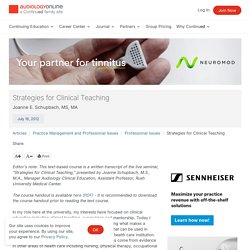
The course handout is available here (PDF) - it is recommended to download the course handout prior to reading the text course. In my role here at the university, my interests have focused on clinical education including clinical teaching, supervision and mentorship. 10. Placement Models and Approaches to Supervision - ClinEdAus. Placement models and approaches to supervision in clinical education Student supervisors need to consider the range of placement options that are available when deciding to offer a clinical education placement.
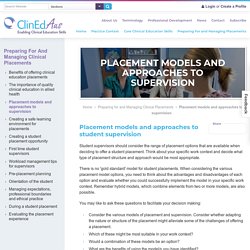
You need to think about your specific work context and decide what type of placement structure and approach is most appropriate. Pubs.asha. Collaborativemodelssupervision. Focusing in on Tele-supervision. We use cookies to offer you a better browsing experience, analyze site traffic, personalize content, and serve targeted advertisements.
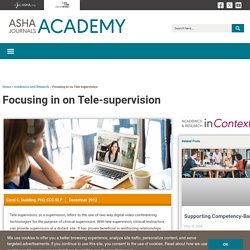
If you continue to use this site, you consent to the use of cookies. Read about how we use cookies and how you can control them by visiting our Cookie Statement. The Collaborative Approach To Clinical Education. Continuum of supervision. CAPCSD Foundations Workbook. School of Communication Sciences and Disorders. Strategies for Clinical Teaching Joanne E. Schupbach Practice Management and Professional Issues Professional Issues 6944. Cultural Competence Check-Ins. Cultural competence, cultural humility, and culturally responsive services all are vital components to each professional interaction. ASHA has developed resources to help you reflect on your current level of cultural competence to improve service delivery. Cultural humility is a dynamic and complex process requiring ongoing self-assessment and continuous expansion of one's cultural knowledge.
Cultural humility forces us to consider power balances and imbalances in our interactions providing a structure to examine personal and institutional accountability. Cultural competence is a necessary component in order to achieve clinical competence. Cultural Competence. Roles and Responsibilities Professional competence requires that audiologists and SLPs practice in a manner that considers the impact of cultural variables as well as language exposure and acquisition on their clients/patients and their family.
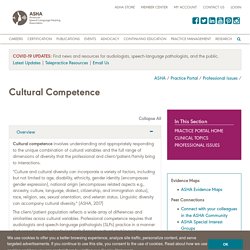
ASHA-certified practitioners have met rigorous academic and professional standards, including knowledge of cultural variables and how they may influence communication. See ASHA's Scopes of Practice in Audiology and Speech Language Pathology as well as Audiology Certification Standards and Speech-Language Pathology Certification Standards. Clinicians are responsible for providing competent services, including cultural responsiveness to clients/patients/families during all clinical interaction. Responsiveness to the cultural and linguistic differences that affect identification, assessment, treatment, and management includes the following: Knowledge and Skills Needed by Speech-Language Pathologists Providing Clinical Supervision. Ad Hoc Committee on Supervision in Speech-Language Pathology About this Document This knowledge and skills document is an official statement of the American Speech-Language-Hearing Association (ASHA).
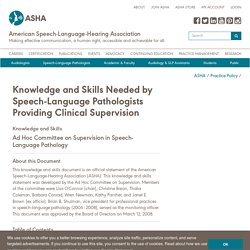
This knowledge and skills statement was developed by the Ad Hoc Committee on Supervision. Members of the committee were Lisa O'Connor (chair), Christine Baron, Thalia Coleman, Barbara Conrad, Wren Newman, Kathy Panther, and Janet E. Brown (ex officio). Council for the Accreditation of Educator Preparation. Audiology.
American Speech-Language-Hearing Association. Home - Council of Academic Programs in Communication Sciences.